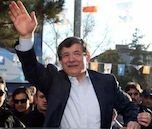Ahmet Davutoğlu was born in Taşkent, Konya Province, Turkey. He graduated from İstanbul Erkek Lisesi, which is a Deutsche Auslandsschule (German International school) and studied at the Department of Economics and Political Science of the Boğaziçi University, İstanbul.
He holds a Master's degree in Public Administration and a PhD degree in Political Science and International Relations from Boğaziçi University.
In 1990 he became an Assistant Professor at the International Islamic University of Malaysia where he established and chaired the Political Science Department until 1993.
Between 1993 and 1999 he worked at Marmara University and became a full professor in 1999. He was the chairman of the Department of International Relations at Beykent University in Istanbul, Turkey.
Between 1995 and 1999 he has worked at Marmara University, teaching at the Institute for Middle Eastern Studies, the Institute for Insurance and Banking, at the Doctoral Program on Local Administrations and Political Science Department.
Between 1998 and 2002 he was a visiting lecturer at the Military Academy and the War Academy.
Following the November 2002 elections he was appointed as Chief Adviser to the Prime Minister and Ambassador at large by the 58th Government of the Republic of Turkey. He continued to serve in the 59th and 60th Governments.
On May 1, 2009 he was appointed as the Minister of Foreign Affairs of the 60th Government of the Republic of Turkey.
He is a father of four children; his wife is a medical doctor. His wife Sare Davutoğlu, a pro-life activist, is working as gynocologist.
He speaks English, German and Arabic.
His publications include Alternative Paradigms: The Impact of Islamic and Western Weltanschauungs on Political Theory, The Civilizational Transformation and The Muslim World in English, Stratejik Derinlik (Strategic Depth), and Küresel Bunalım (The Global Crisis) in Turkish. Especially his bookStrategic Depth is a very influential book in Turkey's foreign policy orientation. He is very influential in the military, academic, and government triangle shaping Turkish foreign policy. (EKN/BM)
* Click here to read the article in Turkish.





